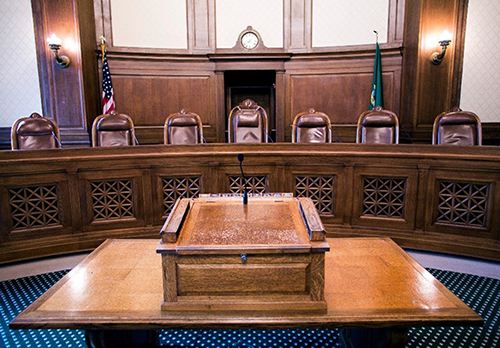You have written a persuasive appellate brief. Months have passed and your case is finally on for oral argument. In the interim you have been busy with other cases and the day-to-day obligations of your law practice, and you may think that re-reading the briefs, skimming the record on appeal, and writing out your argument as a speech is all the preparation you need to deliver a winning presentation to the judges. However, even if you are expecting a “cold bench,” treating oral argument as an afterthought is wasting an important opportunity to convince the court that your client should prevail, especially if one or more judges is on the fence. From thoughtful preparation before the argument to a confident, respectful presentation to the court, here are my top five tips for effective oral argument.

KNOW THE CASE LAW AND THE RECORD
Before you step into the courtroom, you must know the facts, the law, and your arguments, and you must know them COLD. This will give you confidence, which is especially helpful if you don’t have a lot of experience with oral argument or are prone to nerves. More important, having a solid grasp of the material will free you up to really listen to the judges’ questions and to have a meaningful discussion of the issues in your case. An open mind is key to a successful oral argument.
Don’t forget to shepardize the relevant cases to be sure that between the time you submitted briefs and the date of your argument there have been no changes in the law you are relying on. If there has been a favorable new case, be sure to bring hard copies for each of the judges on the panel, as well as your opposing counsel.
“The goal is to have a conversation with the judges.”
PREPARE AN OUTLINE, NOT A SPEECH
While it may be tempting to write out your argument word-for-word, the reality of oral argument, especially with a hot bench, is that the judges are likely to take the argument in an entirely different direction than is set forth in your notes. You do not want to be shuffling papers in a desperate attempt to find an answer to the court’s inquiry. Rigid adherence to an outline will likely result in an ineffective, awkward presentation. The goal is to have a conversation with the judges. Do not try to cover all of the issues in the case; highlight those that are crucial to your client’s success.
The best approach is to prepare and memorize a short introduction, which tells the judges what you asking for on behalf of your client and why you are entitled to it. Provide a roadmap to your argument. That said, be prepared for the possibility that the judges may start to pepper you with questions even before you get through your introduction.
Of course you may get a cold bench in which the judges do not ask a single question. If that happens, you must be prepared to give your argument as a speech. However, do not simply deliver a re-hashing of your brief. Take the opportunity to highlight your strongest arguments and to tell a story. Weave into your argument the idea that you are not only right on the law but are also seeking a just result. Although focused on the legal analysis, the judges are also attuned to fairness considerations and may be persuaded by them in a close case.
PRACTICE, PRACTICE, PRACTICE
Whether it is in front of a mirror, your spouse, or, even better, as a moot court exercise with your colleagues, you should practice giving your argument. Brainstorm potential questions. Having briefed the case, you should know exactly where your weaknesses lie. Be prepared for the judges to go directly to the areas you would prefer to avoid, and be ready with a substantive response. Answer the question as directly as possible, with as much qualification as you need to shift the court’s focus back to your position.
Expect the judges to ask you to do any or all of the following during argument:
- Address hypotheticals
- Concede obvious points
- Distinguish cases
- Respond to intricate statutory or contract construction inquires
- Discuss broad public policy issues
- Respond to questions that seem out of left field
You do not want to be surprised during oral argument. Thorough preparation will allow you to respond to anything the judges throw at you, while enabling you to transition easily between the court’s inquiries and the points you want to make during argument.

BE RESPECTFUL OF THE JUDGES THROUGHOUT YOUR ARGUMENT
Always refer to the judges as “your Honor” or “Justice/Judge ______.” Never interrupt or speak over them; never ask them questions, except to clarify one of the court’s inquires. Take your time in responding to questions; it is okay to pause briefly to collect your thoughts. If your allotted time has expired, either stop speaking or request permission from the court to continue speaking. Be sure to end your argument with a clear, concise statement about the specific relief you want and why you are entitled to it.
Be professional toward your adversary as well. You will lose points with the court for personal attacks on opposing counsel or their arguments.
RESEARCH THE JUDGES ON YOUR PANEL
If you know the names of the particular judges who will be hearing your case, it behooves you to research their backgrounds, as well as their jurisprudence. What kind of law did they practice before taking the bench? Do they have political leanings that may inform their position? Have they written opinions on cases that are similar to yours? You will surely get the court’s attention if you support an argument with a reference to an opinion of one of the presiding judges on the very issue.
Keep in mind that you should always look the judges in the eye during oral argument. It really helps to know as much as you can about the people you are talking to and how they are reacting to what you are saying.
How I Can Help
If you are contemplating an appeal following a loss at trial or on a dispositive motion, or need assistance preparing a strong reply brief, I welcome you to contact me. I have extensive experience handling appeals in state and federal courts throughout Washington State. Call (509) 662-3685 for an appellate consultation.
The information contained in this blog post is provided for informational purposes only and should not be construed as legal advice on any matter.
